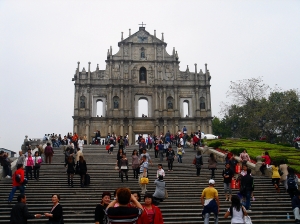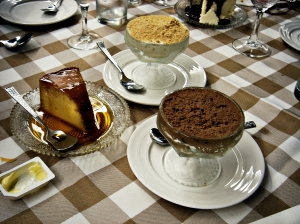Courtesy — This travel piece on Macao was published in my newspaper the Mail Today.
There’s more to Macao than casinos and gambling. Of course you could do all that this Chinese principality is famous for. But you could also do a lot more than just living in the lap of luxury and buying a lot of chips at the dime a dozen casinos.
The only reason I spent some time fooling around with the slot machines in the casinos was because they allow smoking inside. It helped that I won a few Hong Kong dollars while puffing!
But if you are a serious high-roller unlike me, you already know your mind and must have a table booked at the acres of gambling space that every five star hotel seems to have.
Read on if the gambling chips are just one of the distractions you have in mind.
First things first, if you’re an Indian you don’t need a visa to travel to Macao. It’s almost like travelling within the country except you have to go via Hong Kong. And from there it’s just across the channel an hour’s ferry ride away.
It’s a pity that there are no direct flights from India yet to this exotic former Portuguese colony.

A ride from the ferry terminal to any of the hotels downtown could take you through many cities of the world. One moment you could be in Lisbon with its cobbled wavy sidewalks, a few minutes later you could be passing through a narrow street of north Calcutta with iron grilled balconies jutting out of multi-storey houses even as Las Vegas looms on the horizon right ahead with its glitzy facades of casinos.
Macao is a beautiful example of East meets West and they even have a word for it — Mackenese. It not only defines the people of mixed Portuguese and Chinese origin here but also signifies a fusion of cultures that is truly international.
For instance, the Mackenese cuisine is a mouth watering blend of Portuguese and Cantonese style of cooking with Indian, African and Latin American influences thrown in – thanks mostly to the sailors who roamed the continents is search of spices.
This blend of East and West has also given Macao its unique architectural heritage where you could find baroque style churches from the colonial era stand a stone’s throw away from Taoist temples from the Ming dynasty.
Even the road signs are written in Portuguese and Mandarin with the former being the official language despite Macao’s status as a special administrative region of China much like Hong Kong.
For a city that is often called the Las Vegas of the East because of its flourishing casinos, Macao has something to offer for every palette and not only of the culinary kind of which there’s a lot to explore.
But you must work up your appetite before you embark on a gastronomic adventure. Take a walk downtown to Senado Square – the heart of the city — a pedestrian paradise paved with a mosaic of wavy patterns typical of Portugal.
This Unesco world heritage site, one of the most popular tourist haunts in Macao, can take you on a journey to the past with its colonial buildings on both sides of the square and the yellow façade of St Dominic’s church at the opposite end.
Of course the red Mcdonalds signage and the backdrop of modern high-rises will pull you back to the here and present.

Within a short distance from the square lies another landmark of Macao – the ruins of St Paul’s – a 17th century Jesuit church. The burnt out church of which only the façade remains sports a haunting look despite hundreds of tourists milling about.
Together, these ruins and the famed Senado Square are perhaps the most photographed sites in Macao. These two are among the more than two dozen heritage sites that dot the city state so take your pick and don’t miss any of them. From the Penha church built atop the Colina da Penha to the famed A-Ma temple dedicated to the goddess of the sea-farers and fishermen and of course the mount fortress housing the Macao museum.
If you’re feeling a little peckish by now walk right down the steps of the ruins you came up and into the market place lined with shops selling all kinds snacky items. The best part is most shops allow you to taste the snacks for free irrespective of whether you’re buying any of them.
So go right ahead and pick up an almond cookie fresh from the oven or if you’re a meat lover ask for a slice of the spicy pressed pork on display.
Encouraged by our loveable tour guide Alorino, I had my fill of the freebies walking down from one end of the market to the other. And yes, don’t forget to sample the pork chop bun that is Macao’s favourite snack when you visit the Taipa food street along the Rua do Cunha.
Apart from the street food, there are a host of dining options one more richer than the other in terms of culinary experiences. You could take your pick from local Mackenese and Portuguese to Chinese, Italian and African cuisines.
Among the most memorable dining experiences was at chef Antonio Coelho’s restaurant in the Taipa village, which finds a mention in the Michelin food guide. Antonio being a Portuguese specializes in the cuisine of his homeland.

Amid several rounds of red and white wine from his country, he served a lavish spread of seafood, and meat preparations. But the best he reserved for a special Portuguese desert that he prepared right in front of us in the dining hall. Watching a chef at work is a delight that even a less enthusiastic foodie like me found mesmerizing.
And like a true performer he even showed us the trick of opening a champagne with a sword. Of course he chose one of the pretty girls from our group as an assistant to demonstrate the trick!
Gorging on food and sightseeing apart, one should not miss the other entertainment options that make Macao a complete entertainment destination for a family, which the Macao government is keen to promote to the world.
The variety show Cirque de Soleil, the 3D film show at the Macao Science Centre and the lavishly choreographed House of Dancing Water extravaganza by Franco Dragone that opened only a couple of weeks ago should not be missed.
Kewl!! Good to see you after such a looonnnnngggg time.
But, eta ektu ektu faakibaji, tai na????
He he he ektu:)